- Learning time
- 5 minutes
- First play time
- 30 minutes
Karambolage
Designed by: Heinz Meister
Karambolage is one of those family games from the usually-reliable HABA that, despite appearing like silly simplicity, offers a challenge to adults as well.
There’s no board – four large wooden discs form the corners of the play area, with string between them denoting the edges. Six smaller coloured discs are scattered randomly into the play area, then the game begins (youngest player starts!)
On your turn you roll two dice – each side show colours that match the coloured discs. Let’s say you roll red and blue: you now have to move either red into blue or vice versa following a couple of simple rules: the disc you move is moved by a kind of slingshot: a shoe-lace type length of string that is used to propel the chosen disc forward. Assuming you hit the target, neither disc – no discs, in fact – must leave the play area, otherwise your turn is over. You can help avoid that happening with canny placement of a wooden block, which is the only piece you’re allowed to move around with your hands.
If you’re successful, you score a point, and then you face the toughest decision of your life at this moment – bank what you have, or roll the dice again? Rolling again is hugely tempting, but as well as discs leaving the play area there are other pitfalls, not least your capacity to over-flick or under-flick with the tension is high. And worse, often the target discs have other discs blocking the route between them. Now your only chance of success is to pull off a rebound shot using the wooden block – if you’re successful, that’s another point, and you face the same choice again: stick or twist?
The first player to reach ten points wins so pushing your luck can be extremely rewarding, but when you roll orange-yellow and the line between them has every other disc in the way, it can also be loaded with regret.
That’s pretty much the game, although you probably need to establish a house-rule about ricochets. The only other thing we’ve not touched on is rolling doubles: in the event that happens, you simply keep rolling until you roll two distinct colours, but every double-roll ramps up the points by one: so for instance if you roll three sets of doubles before you finally roll two separate colours, that shot will now be worth four points instead of one. If you miss it, the next player’s first shot will be worth four points!
Joe says
This has something of a turn-based Passe-trappe feel about it - the frenzied rush of that replaced with some slightly more cerebral manoeuvring and luck-pushing. A fun little oddity.
The guru's verdict
-
Take That!
Take That!
None, although because of the way the scoring works there is the possibility that a canny player might win the game before you've even had a turn! But they'd need luck on their side. A lot of luck.
-
Fidget Factor!
Fidget Factor!
It can creep up, particularly with four players - probably the game functions best with 2 or 3, although when it's not your turn it is at least quite an entertaining spectacle.
-
Brain Burn!
Brain Burn!
Non-existent
-
Again Again!
Again Again!
Karambolage doesn't really vary from game to game, but there are different approaches to play - slow and steady versus the high-rollin', down-fallin' gambler.

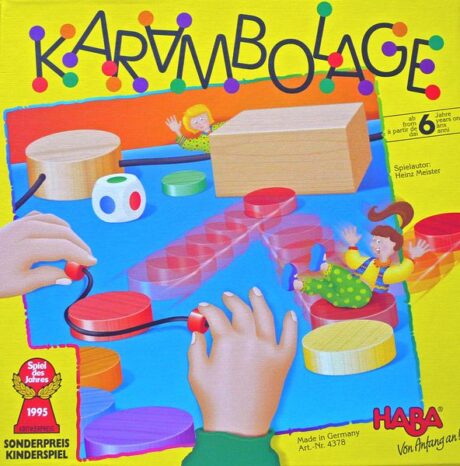
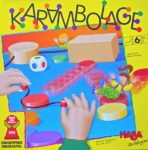
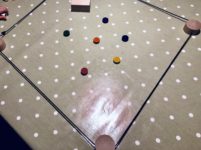


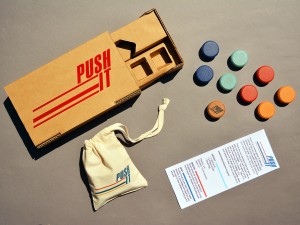
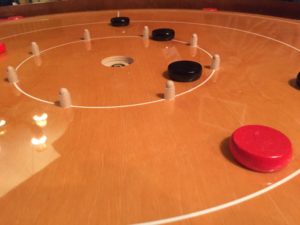

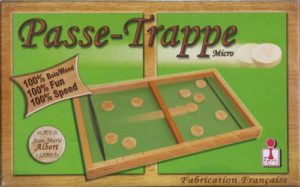
Sam says
I'm a bit of a sucker for this type of silly dexterity game: Rollet was a big hit with us, and I must have played Push It a hundred times. And as with those games, what initially may seem a little like chaos starts to coalesce into something that actually does have tactics to it - albeit not to the point where the fun of that silliness fades away. It probably doesn't stand up to repeated plays in the same way the excellent Crokinole does, but it's an awful lot of fun at the right time.